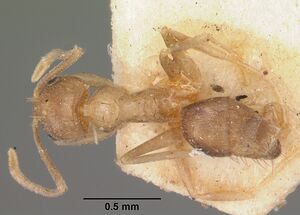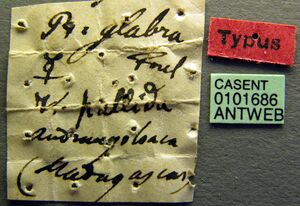Paraparatrechina glabra
| Paraparatrechina glabra | |
|---|---|

| |
| Scientific classification | |
| Kingdom: | Animalia |
| Phylum: | Arthropoda |
| Class: | Insecta |
| Order: | Hymenoptera |
| Family: | Formicidae |
| Subfamily: | Formicinae |
| Tribe: | Lasiini |
| Genus: | Paraparatrechina |
| Species: | P. glabra |
| Binomial name | |
| Paraparatrechina glabra (Forel, 1891) | |
A forest species that feeds on small soil invertebrates. (Lampasona 2015)
Identification
LaPolla et al. (2010) - Elongate mesosoma (WL: 0.4–0.6), with pronotum rise of about 45° from anterior margin to dorsum; REL ≥ 20.
Compare with: Paraparatrechina myops and Paraparatrechina ocellatula. Workers of this species are easily distinguished from the other Malagasy Paraparatrechina by the presence of large eyes.
Keys including this Species
Distribution
Latitudinal Distribution Pattern
Latitudinal Range: 3.416666667° to -25.05194444°.
| North Temperate |
North Subtropical |
Tropical | South Subtropical |
South Temperate |
- Source: AntMaps
Distribution based on Regional Taxon Lists
Malagasy Region: Madagascar (type locality).
Distribution based on AntMaps
Distribution based on AntWeb specimens
Check data from AntWeb
Countries Occupied
| Number of countries occupied by this species based on AntWiki Regional Taxon Lists. In general, fewer countries occupied indicates a narrower range, while more countries indicates a more widespread species. |

|
Estimated Abundance
| Relative abundance based on number of AntMaps records per species (this species within the purple bar). Fewer records (to the left) indicates a less abundant/encountered species while more records (to the right) indicates more abundant/encountered species. |

|
Biology
Castes
Worker
Images from AntWeb
   
| |
| Syntype of Paraparatrechina glabra. Worker. Specimen code casent0101565. Photographer April Nobile, uploaded by California Academy of Sciences. | Owned by MHNG, Geneva, Switzerland. |
   
| |
| Syntype of Paraparatrechina glabra. Worker. Specimen code casent0101686. Photographer April Nobile, uploaded by California Academy of Sciences. | Owned by MHNG, Geneva, Switzerland. |
   
| |
| Syntype of Paraparatrechina glabra. Worker. Specimen code casent0101844. Photographer April Nobile, uploaded by California Academy of Sciences. | Owned by MHNG, Geneva, Switzerland. |
Nomenclature
The following information is derived from Barry Bolton's Online Catalogue of the Ants of the World.
- glabra. Prenolepis glabra Forel, 1891b: 92 (w.) MADAGASCAR. LaPolla, Cheng & Fisher, 2010: 16 (q.m.). Combination in Pr. (Nylanderia): Emery, 1914f: 422; in Paratrechina (Nylanderia): Emery, 1925b: 219; in Paraparatrechina: LaPolla, Brady & Shattuck, 2010a: 128.
Unless otherwise noted the text for the remainder of this section is reported from the publication that includes the original description.
LaPolla et al. (2010):
Description
Worker
(n=39): TL: 1.38–2.22; HW: 0.35–0.48; HL: 0.41–0.58; EL: 0.1–0.129; SL: 0.47–0.64; PW: 0.25–0.33; WL: 0.44–0.66; PDH: 0.21–0.28; PrFL: 0.35–0.48; PrFW: 0.1–0.134; GL: 0.476–0.91. Indices: CI: 75–102; REL: 20–26; SI: 104–140; FI: 24–36.
Head brownish-yellow to yellowish-brown, with darker segmental and mandibular margins; head slightly longer than broad. Head pubescence variable from appressed to suberect, with a shining cuticular surface. Scapes surpass posterior margin by about the length of the first 4 funicular segments; scapes with appressed pubescence. Mesosoma brownish-yellow to yellowish-brown and elongate; fine, appressed pubescence covers entire mesosomal dorsum. Pronotum rises about 45° from anterior margin to dorsum; propodeum possesses a short, angular dorsal face with a long declivitous face. Legs are often lighter in color than the mesosoma, with the trochanters and tarsi often whitish-yellow. The gaster is similarly colored as head and mesosoma.
Queen
(n=1): TL: 5.09; HW: 1.0; HL: 0.94; EL: 0.29; SL: 0.97; PW: 1.09; WL: 1.79; PDH: 0.58; PrFL: 0.88; PrFW: 0.27; GL: 2.36. Indices: CI: 108; REL: 28; SI: 96; FI: 30.
As in worker, with modifications expected for caste. Pubescence very dense, extending from dorsum to lateral regions of the mesosoma.
Male
(n=3): TL: 2.1–2.28; HW (including eyes): 0.52–0.53; HL: 0.45–0.47; EL: 0.2–0.22; SL: 0.33–0.34; PW: 0.38–0.38; WL: 0.69–0.71; PrFL: 0.52–0.56; PrFW: 0.11–0.12; GL (including parameres): 0.94–1.1. Indices: CI: 112–115; REL: 44–46; SI: 63; FI: 6–21.
Head dark brown, with bulging large eyes that occupy most of the lateral region of the head; three prominent ocelli present. Head slightly broader than long. Palps distinctly lighter than head in color. A dense layer of pubescence covers head. Scapes surpass posterior margin by less than half of the length of the first funicular segment; scapes are slightly lighter in color than surrounding head. Antennae 13-segmented. Mandible with apical tooth and indistinct basal angle. Mesosoma dark brown as in head; pronotum short and collar-like; mesonotum large, rounded anteriorly, overarching pronotum; mesosoma dorsum flat, with suberect setae. Declivity indistinct from propodeum; propodeum lower than mesonotum and scutellum. Gaster dark brown, covered with pubescence and scattered erect setae. Parameres elongate, with scattered erect setae, especially towards apices.
Type Material
3 syntype workers examined, MADAGASCAR (Musee d'Histoire Naturelle Genève).
References
- Emery, C. 1914f. Les fourmis de la Nouvelle-Calédonie et des îles Loyalty. Nova Caled. A Zool. 1: 393-437 (page 422, Combination in Pr. (Nylanderia))
- Emery, C. 1925d. Hymenoptera. Fam. Formicidae. Subfam. Formicinae. Genera Insectorum 183: 1-302 (page 219, Combination in Paratrechina (Nylanderia))
- Forel, A. 1891c. Les Formicides. [part]. In: Grandidier, A. Histoire physique, naturelle, et politique de Madagascar. Volume XX. Histoire naturelle des Hyménoptères. Deuxième partie (28e fascicule). Paris: Hachette et Cie, v + 237 pp. (page 92, worker described)
- Lampasona, T. P. 2015. Malagasy Ant Pheidole longispinosa (Forel, 1891) Behavior as Regionally Dominant Ant Predator in Rainforest Environment (Hymenoptera: Formicidae). Journal of Insect Behavior. 28:359-368. doi:10.1007/s10905-015-9508-2
- LaPolla, J.S., Cheng, C.H. & Fisher, B.L. 2010. Taxonomic revision of the ant genus Paraparatrechina in the Afrotropical and Malagasy regions. Zootaxa. 2387: 1-27.
- Wheeler, W. M. 1922k. Ants of the American Museum Congo expedition. A contribution to the myrmecology of Africa. IX. A synonymic list of the ants of the Malagasy region. Bull. Am. Mus. Nat. Hist. 4 45: 1005-1055 (see also)
References based on Global Ant Biodiversity Informatics
- Fisher B. L. 1997. Biogeography and ecology of the ant fauna of Madagascar (Hymenoptera: Formicidae). Journal of Natural History 31: 269-302.
- Fisher B. L. 2003. Formicidae, ants. Pp. 811-819 in: Goodman, S. M.; Benstead, J. P. (eds.) 2003. The natural history of Madagascar. Chicago: University of Chicago Press, xxi + 1709 pp.
- LaPolla J. S., C. H. Cheng, B. L. Fisher. 2010. Taxonomic revision of the ant (Hymenoptera: Formicidae) genus Paraparatrechina in the Afrotropical and Malagasy region. Zootaxa 2387: 1-27.
- Lapolla, J. S., C. H. Cheng, and B. L. Fisher. "Taxonomic revision of the ant (Hymenoptera: Formicidae) genus Paraparatrechina in the Afrotropical and Malagasy Regions." Zootaxa 2387 (2010): 1-27.

